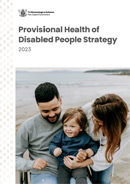Providing better health outcomes for disabled people
The Health of Disabled People Strategy is the first dedicated, health system-led strategy for disabled people in Aotearoa New Zealand.
The Health of Disabled People Strategy sets the direction and long-term priorities for the new health system to move towards achieving equity in disabled people’s health and wellbeing outcomes over the next ten years.
It provides a framework to guide health entities in improving health outcomes for disabled people and their whānau.
Why a Health of Disabled People Strategy?
Disabled people experience poorer health than non-disabled people and they acutely feel these inequities. These outcomes are influenced by unfair barriers to full participation in society, including access to and experiences of health care.
Disabled people make up a significant and diverse part of Aotearoa New Zealand, with 1.1 million people (24 per cent of the population) identified as disabled.
Our vision is to achieve pae ora | healthy futures for disabled people and their whānau in Aotearoa New Zealand. This is a future in which all disabled people and their whānau live long, fulfilling and more independent lives in good health.
Five key priorities
- Priority 1: Embed self-determination of disabled people and their whānau as the foundation of a person and whānau-centred health system.
- Priority 2: Ensure the health system is designed by and accessible for disabled people and their whānau, and provides models of care that suit their needs.
- Priority 3: Ensure the health system is part of a coherent cross-government system that addresses broader drivers of poor health and wellbeing.
- Priority 4: Build health workforce capacity and capability to meet the needs of disabled people and their whānau.
- Priority 5: Increase the visibility of disabled people in health data, research and evidence.
These priority areas were developed through engagement with disabled people and their whānau, disability organisations and consultation with other government agencies, including Whaikaha – Ministry of Disabled People.
The Health of Disabled People Strategy is being published in a provisional form to allow for further targeted engagement with the disability community and further shaping of priorities.

